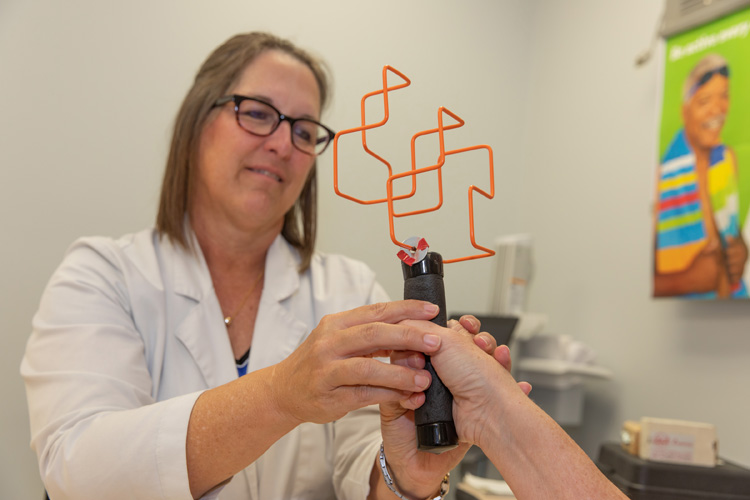
Your hands – especially as you age – are subject to the modern-day equivalent of all “the slings and arrows of outrageous fortune” which, according to the American Society for Surgery of the Hand, can include falls, accidents, traumas, wounds, scars, burns, injured tendons or nerves, fractures, arthritis and even various neurologic conditions brought on by stroke.
That’s where occupational therapists like Debbie Matthews at Sebastian River Medical Center can step in to help.
Matthews is a certified hand therapist, or CHT – a designation that does not come easily.
The Hand Therapy Certification Commission says a CHT is “an occupational therapist or physical therapist who has a minimum of three years of clinical experience, including 4,000 hours or more in direct practice in hand therapy.”
Additionally, the commission states, CHTs must successfully pass a comprehensive test of advanced clinical skills and theory in upper quarter rehabilitation, and they are “required to demonstrate continued professional development and competency by re-certifying every five years.”
That “upper quarter” line is significant. It means certified hand therapists must also be trained to treat arms, wrists, shoulders and elbows.
Matthews says she sees “a lot of post-operative humoral fractures because we have a higher population of the elderly here and they tend to fall more often, so a lot of the things that I see are distal radius fractures (broken wrist), radial head fractures (broken elbow), and humoral fractures (a break in the bone that connects the elbow and shoulder). That’s a lot.”
Those particular injuries, which can result from people trying to break a fall with their arms, Matthews adds, are especially common in women.
She says she also spends considerable time working with post-operative shoulder replacement patients, often within 24 to 48 hours after the orthopedic surgeon prescribes physical therapy.
But as a certified hand therapist, she also sees her fair share of what many people believe are their single most important appendages – their hands.
Matthews, who “has been a hand therapist since 2005,” says most people “take their hands for granted until they becomes a problem.”
“The hand,” she continues, “is complex and it requires considerable study to understand the mechanics.”
That may be something of an understatement given there are some 27 separate bones in the human hand, along with scores of muscles, nerves and tendons.
Whether a patient comes to Matthews for therapy after hand surgery or because of an arthritic condition or some type of injury, she says “my main goal is to help them to be able to take care of their basic needs [such as] bathing, dressing, grooming, feeding and using the toilet. Once we meet those goals we go on to the next level, which is like shopping, driving and exercise.”
Sometimes, however, that isn’t easy.
For starters, as Stanford University Health Care points out, after a surgery, “your hand may be immobilized in a bandage or splint,” sometimes for months, so it can take some time before physical therapy can begin in earnest and when it does, there are rules to follow.
Occupational therapists like Matthews and your surgeon are the arbiters of those rules.
“I’d say I’m firm but friendly,” Matthews explains. “I tell [my patients] the truth on their first visit, that we’re going to work together but it’s not going be pain-free.
“They know from the get-go with me that I don’t pull any punches. I’m very black and white. They know exactly how long they’re going to be here, what we’re going to do and what to expect. If [some exercise] hurts too much, tell me and we’ll take a break.”
When pressed about patient compliance with her at-home exercise therapies, Matthews admits some do better than others.
“If I say do this exercise three times a day, some will only do it once a day. Others will do too much. I tell them to do it once a day and they do it five times a day and then they are in pain. They thought if they did it more they would get better faster. They thought they were doing the right thing, but actually they’re harming themselves.”
The best bet, she says, is to follow the instructions, and before doing any additional exercises, talk to your therapist at your next session.
Debbie Matthews is an occupational therapist and certified hand therapist with the rehabilitation services at Sebastian River Medical Center, a Steward Family Hospital. The address is 8005 Bay Street, Suite II in Sebastian. The phone number is 772-581-2068.



